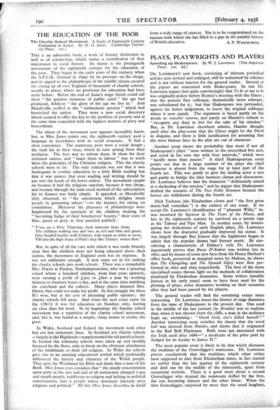THE EDUCATION OF THE POOR
THIS is an admirable book, a work of literary distinction as well as of scholarship, which makes a contribution of first importance to social history. Its theme is the propaganda movements of the eighteenth century for the education of the poor. They began in the early years of the century, when the S.P.C.K. (formed in 1699) by its pressure on the clergy, and its appeal to the philanthropy of the middle classes, secured the setting up all over England of thousands of charity schools, usually in places where no provision for education had been made before. Before the end of Anne's reign Steele could call them "the greatest instances of public spirit" the age had produced, Addison "the glory of the age we live in." And Mandeville scoffed at the "enthusiastic passion" which had bewitched the nation. They were a new social discovery which seemed to offer the key to the problem of poverty and at the same time coincided with the highest motives of piety and benevolence.
The idiom of the movement now appears incredibly harsh, but, as Miss Jones points out, the eighteenth century used a language in accordance with its social structure. It had a clear conscience. The numerous poor were a social danger ; the fault lay in their vices, which in turn sprang from their irreligion. The best way to reform them, fit them for their ordained station, and "inure them to labour" was to teach them the principles of the Christian religion. This the charity schools were to do. The only criticism was not that it was inadequate to confine education to- a little Bible reading but that it was unwise that even reading and writing should be put into the heads of the lower orders. The movement caught on because it had the religious sanction, because it was cheap, and because through the joint-stock method of the subscription list its finance was fairly simple. It appealed, as Mandeville slyly observed, to "the satisfaction which delights mean people in governing others "—to the instinct for sitting on committees. Moreover the pleasures of philanthropy were heightened by the spectacle of the children wearing the "becoming badge of their benefactors' bounty," their coats of blue, green or grey, as they paraded publicly :
" T'was on a Holy Thursday, their innocent faces clean, The children walking two and two, in red and blue and green, Grey headed beadles walled before, with wands as white as snow, Till into the high dome of Paul's they like Thames' waters flow."
But, in spite of all the care with which it was made brutally clear that the children were not being educated above their station, the movement in England soon lost its impetus. It was not utilitarian enough. A new craze set in for making the charity schools into work schools. There was a remarkable Mrs. Harris at Findon, Northamptonshire, who ran a spinning school where a hundred children, from four years upwards, were earning a profit of £5oo or £600 a year by working thirteen or fourteen hours a day, and at the same time imbibing the catechism and the collects. Many places imitated Mrs. Harris, but could not make her profit. In this struggle the three R's won, but at the cost of alienating public opinion ; the charity schools fell away. And when the next craze came (in the 1780's) it was for education on Sundays only, leaving six clear days for work. In its beginnings the Sunday school movement was a repetition of the charity school movement, and, like it, was hailed as a simple, cheap means to civilise the poor.
In Wales, Scotland and Ireland the movement took other but not less systematic lines. In Scotland 500 charity schools —largely in the Highlands—supplemented the old parish schools. In Ireland the voluntary schools were taken up and lavishly financed by the State, only to break on the obstinate attachment of the inhabitants to their old religion. In Wales the schools gave rise to an amazing educational revival which profoundly influenced the history and character of the Welsh people. They gave the Welshman his Bible and made him a man of the Book. Miss Jones even considers that" the steady concentration upon piety as the aim and end of all instruction changed a gay and simple people, indifferent to religion and lacking in political consciousness, into a people whose dominant interests were religious and political." All this Miss Jones describes in detail from a wide range of sources. She is to be congratulated on the • Auccess with which she has filled in a gap in the painful history














































 Previous page
Previous page